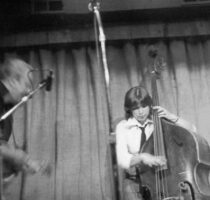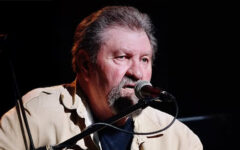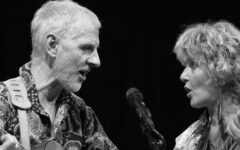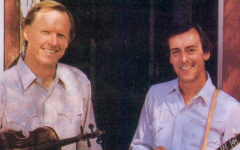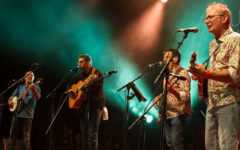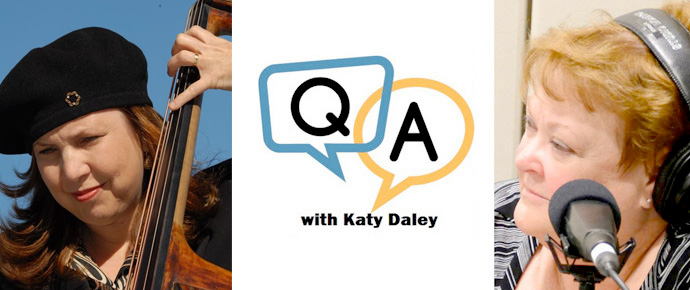
Last month, I was taken by a photo on Missy Raines’ Facebook page showing her playing bass onstage at the Birchmere while John Duffey leaned in and chopped mandolin. They say a picture is worth a thousand words but a thousand words weren’t enough for me. I wanted to know the backstory to this 1984 photo, and this interview is perfect to share on the anniversary of John’s passing in 1996.
MR: The original Country Gentlemen played a big part in my childhood because my mom was such a huge fan. I don’t remember a time when that music wasn’t being played in my home on the stereo. The names John and Charlie, Tom and Eddie were always being talked about.
My mom was actually a big John Duffey fan, more than the other three so when the Seldom Scene started that was the obvious place for us to follow. I got to hear Tom play on records and I got to see him play. I did get to see Tom play with the Country Gentlemen but only as part of the reunion shows that Carlton Haney used to do.
One of my aunts was the president of the Country Gentlemen Fan Club. She lived in Hagerstown, Maryland and one day they drove to our house unexpectedly. I got to play with my cousins and my aunt went inside. Then all the kids went inside. The door was closed and when I opened it I saw my mother and my aunt sitting in the living room with Country Gentlemen records playing. That wasn’t unusual except my mother and my aunt were crying. I looked at my cousin and said, “Oh my God, who died? What happened?” She said, “You didn’t know?” “Know what?” I asked. And she said, “John Duffey’s leaving the Country Gentlemen!” “Oh no,” I said. I looked back at my mother and my aunt and they’re just boo-hooing. I’ll never forget that.
KD: (laughter) That’s a great story. Years later you were playing with a band and got to meet some of the people you had listened to for a long time.
MR: I played in a band called Hooker Holler Symphony with Pat Shields, Diana Haynes and Ricky Lee Roberts. We played a lot of places around Maryland, DC, West Virginia and Pennsylvania. Betty Eldridge saw us play and said, “This girl needs to meet Tom Gray.” I was about 12 or 13. Ben and Betty had a picking party at their house and they invited me and my parents. That was a huge deal. I got to meet Tom and he was very sweet. That started our long friendship and mentorship. I would always seek him out at festivals. He always found time to talk to me. One time at Wise, Virginia Tom said, “You know I don’t think I’ve ever really taken time off from any gigs but if I were going to, I would get you to fill in and I’ve already told the guys this.” Katy, I can’t tell you how exciting that was for me.
KD: Wow! How old were you?
MR: At that point I’m guessing I was like 16 or 17. (laughter) I went nuts! It was all I could think about. I’ll tell you that it even cost me a gig because right out of high school I joined a band in Ohio. Someone recently reminded me that when I joined the band apparently I said, “I want to play in this band and I’ll be available for any gig EXCEPT (laughter) when Tom Gray calls and tells me he wants me to fill in for him with the Seldom Scene.”
KD: Did they believe you?
MR: Apparently they did because they fired me. Of course, many years later I realized how completely naïve I was (a) for putting so much emphasis on it and (b) for telling people about it. Just in every respect. I get that now but then all I knew was I wasn’t going to pass that opportunity up. I was about 18 then and the call never came for several years. I remember it was the summer of 1984. I remember because my father died March 14, 1984. When I got the call the first thing I thought was that my father wouldn’t be there.
KD: Oh that’s so sad.
MR: That was the first thing that went through my head. Summer of 1984 is when the call came and it still meant everything. I couldn’t believe it was happening but it was diminished somewhat by the fact that my father wouldn’t be there.
KD: I’m sorry he didn’t get to see it. Let me ask, between the time Tom mentioned this to you and when the call actually came, did you put on all your Seldom Scene albums and practice along? How did you learn all their material?
MR: I already knew a lot of it. Yes, the first time he told me I went home and immediately learned and played along with the records as much as I could. But after a few years I didn’t keep practicing the material. I just kept it in the back of my head. I guess I thought after a while it wasn’t going to happen. When the call finally came I was like “There’s not enough time to get ready!”
KD: How much lead time did you get? Did they call you on a Wednesday and ask you to come in the next night?
MR: No, it was probably a month or six weeks. I don’t remember. That was a hard year. I was playing with the band Cloud Valley. Two weeks after we buried my dad, the band was scheduled to leave for a six-week European tour. Everyone, including my mom, said I should go. I did go and I’m glad I did but it was hard. When I got home we were still dealing with grief, naturally. So when the call came it was a fabulous distraction and my mom got to be there so it was really awesome.
KD: Did they give you a set list? Did you know what you would play in advance? Did you get together and rehearse?
MR: No, no and no. There was no set list. Tom said they almost always did Wait a Minute and he named a few other songs. There was a show they were doing at the time. I figured I would know all of that and I guess they thought I would just know all the other stuff. I think John just picked tunes as he went along and you just had to be ready. That whole concept seemed gargantuan at the time. Looking back it wasn’t that hard because truly I had been listening to the Seldom Scene since they started.
KD: You and me both. 1984 means it would have been at the middle Birchmere. The band would have been John Duffey, Ben Eldridge, Mike Auldridge, Phil Rosenthal and you sitting in for Tom. What time did you get down there for the 8:00 show?
MR: Sometime that afternoon. I don’t remember us rehearsing at all. I just remember getting into the back room and wanting to rehearse but I didn’t think Duffey wanted to rehearse. I’m a little worried that what I wrote on Facebook would make Duffey sound cold.
KD: Here’s what you wrote on your Facebook page on 19 November 2017: “Oh my gosh! It was an amazing experience! No, we didn’t rehearse, at all. They were SO nice to me. Ben, Mike and Phil made me feel very comfortable but I was too scared to be comfortable – HA! Duffey definitely didn’t spend any time trying to put me at ease, but he bolstered and empowered me by just treating me like ‘one of the guys’ and giving me this look, that to me, said, “I know you can do it, now let’s see what ya got.” Being on stage next to him was intoxicating. His presence was huge. I wish I could talk to him today – all these years later and let him know what an influence he has been and how he helped shape who I am.”
MR: Duffey treated me like he always treated me. Which was, he would always have like a crinkly smile in his eye but then he would always say sometime smartass. (laughter)
KD: Another of your entries on Facebook on that same day said: “It would seem to me that there aren’t very many people who give as much of themselves onstage as John Duffey did. Folks who come to mind (IMO) are Sam Bush, Jim Hurst, Robbie Fulks. There are more of course. But I’m talking about playing (and singing) from somewhere so deep and caring so much about it, and caring about supporting you as much as what they are doing, and feeding you that kind of energy that lifts you up when you play music with them. It’s a beautiful thing”
In the photo I see he was leaning in towards you doing those mandolin chops. You’re looking down. There’s no one else in the picture. Do you remember that moment?
MR: I remember him turning around and looking at me, smiling, egging me on and making lots of jokes. The energy he gave me on stage. I felt completely lifted and carried. It wasn’t just me. I felt him doing that for everyone.
When he was up there in his element and having a good time, there was so much coming out of him, you couldn’t help but being pulled into it. That’s a really great thing. I’ve played with a lot of people and they all have different energy levels. Some people are really closed and tight. They can still be fantastic but they don’t exude the same energy. He was never closed he was just (explosive sound) wide open. He made me experience it from a much more joyful place.
KD: John died December 10, 1996. Hard to believe that was 21 years ago. What are your thoughts about John’s legacy?
MR: Where do I begin? I think John heralded in the 2nd Generation of bluegrass. He did so many things that changed the way things were done starting with his emcee work. When I was growing up so many of the bands said the same things between songs. It felt very scripted and very strict. When some of the younger bands came out, frankly they didn’t know what to say. They may have said some funny things but those things were aimed at one demographic so not everyone got the joke. And then you had John Duffey. He was an entertainer. He bought in current events in a way that made them funny. He brought up issues that were taboo and controversial and people either laughed or they didn’t. I remember watching him and thinking “when I play music, I want to be like that.” I could relate to him. I thought for years about what he was doing. He wasn’t following any formula, he was just being himself. I think he pioneered that change in emcee work.
And musically, from what Eddie tells me, when Eddie joined the Country Gentlemen, they were doing mostly Osborne Brothers covers. Eddie wanted to change and John wanted to change. John was the one who went and started finding music from other genres like Bob Dylan stuff and songs that were being done outside bluegrass at the time. The whole band created it, arranged it and made it happen but by John going and looking outside the genre, he changed the direction of bluegrass. At that time the Country Gentlemen became a progressive, contemporary band. They were ahead of their time and John was a part of that.
With his mandolin playing, I think he was a leader in that regard. You could hear his playing and you could immediately distinguish it from anyone else around him at the time. In the early years of the Country Gentlemen, you could hear his influences but by the time he got to the Seldom Scene, he was just going for it. You would hear it and say, Oh yes, that’s Duffey.
KD: So bands like the Country Gentlemen and the Seldom Scene with their openness and willingness to try different things and different genres of music and play it in their style, were springboards for bands like Missy Raines and the New Hip. Is that safe to say? You’ve explored different styles of music and incorporated a bit of jazz into bluegrass.
MR: Absolutely. Completely. I put him in the same boat as Sam Bush and Dave Grisman. People may view them as a bit more traditional but the Scene was doing Eric Clapton and Bob Dylan tunes at a time when nobody else was doing that. Maybe some younger bands like Bottle Hill and Sam Bush but they had been influenced by the Country Gentlemen. Duffey was the middle ground between the 1st Generation and Sam and all that. I don’t know my history completely on this but I think Duffey was born and raised in the Metropolitan Washington area. He grew up urban and yet he played bluegrass. I think that had a huge impact on everything – how he ran the band, how he talked on stage and his music. For those of us who lived near that Metro area, we got to see that and it made perfect sense to us. He brought that urban sensibility into bluegrass and made the music palatable for the people who were urban. That’s huge.
KD: He adapted the Appalachian music but not necessarily the culture. I always said I didn’t think any of the Seldom Scene boys ever saw the inside of a log cabin but that didn’t stop them from making great bluegrass.
MR: By adapting it and playing it and going forward, he changed it. You can’t do that without affecting change and he did.
KD: The Scene was one of the first bands to stop wearing band uniforms. When I mention that to people today they shrug but that was a big deal at the time. It was another way they stepped away from the outward tradition of the music. It’s not that they didn’t respect tradition. It just didn’t fit who they were so they went more with who they were.
MR: Even their album artwork was different! It wasn’t avant-garde but it was more modern than other bands. The other thing they did was the whole jam thing on stage. Everybody does it now but they did it long before anyone else. The New Grass Revival did it clearly taking from a rock influence. The Seldom Scene would get in a groove, John would do his thing, Tom would solo and they would all play off each other. In my mind, that kind of thing had not happened before them. I remember seeing them close out festivals and they would do that. You never knew what they were going to do or what John was going to say. That’s another reason people wanted to be there is because you never knew what was going to happen.
KD: Missy, you have won 7 IBMA Bass Player of the Year awards. You’ve had a lot of wonderful experiences playing music and traveling around the world. I’m glad you shared that picture first on Facebook and now here because it brought back a lot of wonderful memories for many, many people.
MR: I have only four photos on my desk and that’s one of them. It was a pretty special time for me and my mom because of our long-time connection with John, the Country Gentlemen, the Seldom Scene and Tom’s mentorship. It runs so deep. It’s a really, really powerful memory for me.

